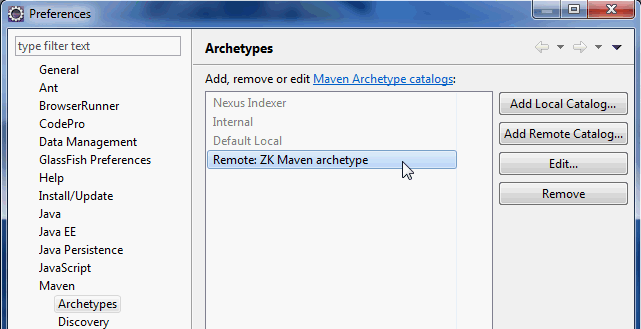Setting Up ZK Spring using Maven"
(→Adding ZK Spring library dependencies: remove jboss.el , zk version with zkspring version) |
(rewrite for supported Spring version) |
||
| Line 1: | Line 1: | ||
{{ZKSpringEssentialsPageHeader}} | {{ZKSpringEssentialsPageHeader}} | ||
| − | |||
| − | == | + | = Create a New Project with ZK Archetype = |
| − | |||
| − | + | The simplest way to create a ZK maven project is using archetype: '''zk-ee-eval-archetype-webapp-spring'''. A project generated by this archetype will include required ZK and spring dependencies and ZK maven evaluation repository. | |
| − | + | If you use maven in a console, you need to specify ZK archetype catalog URL, http://mavensync.zkoss.org/eval/archetype-catalog.xml, to generate your project. Please refer to [http://maven.apache.org/archetype/maven-archetype-plugin/examples/generate-alternative-catalog.html Generate project using an alternative catalog]. | |
| − | |||
| − | + | If you use eclipse, you can add the catalog URL via Window / Preferences / Maven / Archetypes. | |
| − | + | [[File:eclipse-archetypes.png | center]] | |
| − | + | ||
| − | + | Then select File / New / Other / Maven Project to create a maven project. | |
| − | |||
| − | |||
| − | |||
| − | |||
| − | |||
| − | + | = Adding ZK Spring Dependencies = | |
| − | + | After creating a project, you still need to add ZK Spring dependencies. ZK Spring has 3 artifacts, you can add them upon your requirement. | |
| − | For ZK '''5''', you can use '''3.0''' or | + | For ZK '''5''', you can use '''3.0''' or above. |
| − | For ZK '''6''', you should use '''3.1'''. | + | For ZK '''6''' or above, you should use '''3.1''' or above. |
| − | '''ZK Spring Core | + | '''ZK Spring Core''' |
<source lang="xml"> | <source lang="xml"> | ||
| Line 35: | Line 27: | ||
<groupId>org.zkoss.zk</groupId> | <groupId>org.zkoss.zk</groupId> | ||
<artifactId>zkspring-core</artifactId> | <artifactId>zkspring-core</artifactId> | ||
| − | <version>3.1</version> | + | <version>3.1.1</version> |
</dependency> | </dependency> | ||
</source> | </source> | ||
| − | |||
| − | |||
'''ZK Spring Webflow''' | '''ZK Spring Webflow''' | ||
| Line 47: | Line 37: | ||
<groupId>org.zkoss.zk</groupId> | <groupId>org.zkoss.zk</groupId> | ||
<artifactId>zkspring-webflow</artifactId> | <artifactId>zkspring-webflow</artifactId> | ||
| − | <version>3.1</version> | + | <version>3.1.1</version> |
</dependency> | </dependency> | ||
| Line 57: | Line 47: | ||
<groupId>org.zkoss.zk</groupId> | <groupId>org.zkoss.zk</groupId> | ||
<artifactId>zkspring-security</artifactId> | <artifactId>zkspring-security</artifactId> | ||
| − | <version>3.1</version> | + | <version>3.1.1</version> |
</dependency> | </dependency> | ||
</source> | </source> | ||
| − | + | = Configuration in web.xml = | |
| − | + | You need to declare Spring <tt>ContextLoaderListener</tt> in the <tt>web.xml</tt> file to be able to declare and register your Spring beans with Spring framework. | |
<source lang="xml"> | <source lang="xml"> | ||
<listener> | <listener> | ||
| Line 75: | Line 65: | ||
! Version !! Date !! Content | ! Version !! Date !! Content | ||
|- | |- | ||
| − | | | + | | 3.1.1 |
| − | | | + | | 2014/10/07 |
| − | | | + | | rewrite for supported Spring version |
|} | |} | ||
{{ZKSpringEssentialsPageFooter}} | {{ZKSpringEssentialsPageFooter}} | ||
Revision as of 07:43, 7 October 2014
Create a New Project with ZK Archetype
The simplest way to create a ZK maven project is using archetype: zk-ee-eval-archetype-webapp-spring. A project generated by this archetype will include required ZK and spring dependencies and ZK maven evaluation repository.
If you use maven in a console, you need to specify ZK archetype catalog URL, http://mavensync.zkoss.org/eval/archetype-catalog.xml, to generate your project. Please refer to Generate project using an alternative catalog.
If you use eclipse, you can add the catalog URL via Window / Preferences / Maven / Archetypes.
Then select File / New / Other / Maven Project to create a maven project.
Adding ZK Spring Dependencies
After creating a project, you still need to add ZK Spring dependencies. ZK Spring has 3 artifacts, you can add them upon your requirement.
For ZK 5, you can use 3.0 or above.
For ZK 6 or above, you should use 3.1 or above.
ZK Spring Core
<dependency>
<groupId>org.zkoss.zk</groupId>
<artifactId>zkspring-core</artifactId>
<version>3.1.1</version>
</dependency>
ZK Spring Webflow
<dependency>
<groupId>org.zkoss.zk</groupId>
<artifactId>zkspring-webflow</artifactId>
<version>3.1.1</version>
</dependency>
ZK Spring Security
<dependency>
<groupId>org.zkoss.zk</groupId>
<artifactId>zkspring-security</artifactId>
<version>3.1.1</version>
</dependency>
Configuration in web.xml
You need to declare Spring ContextLoaderListener in the web.xml file to be able to declare and register your Spring beans with Spring framework.
<listener>
<listener-class>org.springframework.web.context.ContextLoaderListener</listener-class>
</listener>
Version History
| Version | Date | Content |
|---|---|---|
| 3.1.1 | 2014/10/07 | rewrite for supported Spring version |
